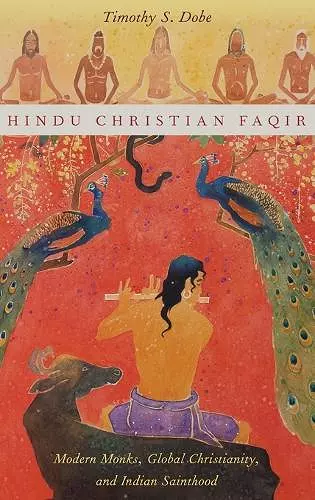Hindu Christian Faqir
Modern Monks, Global Christianity, and Indian Sainthood
Format:Hardback
Publisher:Oxford University Press Inc
Published:29th Oct '15
Currently unavailable, and unfortunately no date known when it will be back

Hindu Christian Faqir compares two colonial Indian saints from Punjab, the neo-Vedantin Hindu Rama Tirtha (1873-1906) and the Christian convert Sundar Singh (1889-1929). Timothy S. Dobe shows that varied asceticisms, personal exemplary models, and material religion exuded their ambivalent and powerful public presence in Protestant metropolitan centers as much as in colonial peripheries. Challenging ideas of the invention of modern Hinduism, the transparent translation of Christianity, and the construction of saints by devotees, this book focuses on the long-standing, shared religious idioms on which these two men creatively drew to appeal to transnational audiences and to pursue religious perfection. Following both men's usage of Urdu, the book adopts the word "faqir" to examine the vernacular and performative dimensions of Indian holy man traditions, thereby calling special attention to missionary and Orientalist anti-ascetic accounts of the "fukeer" indigenous Islamic traditions and this-worldly religion. Exploring Rama Tirtha and Sundar Singh's global tours in Europe and America, self-conscious sartorial styles, and intimate autobiographical writings, Dobe demonstrates that the vernacular holy man traditions of Punjab provided resources that both men drew on to construct their forms of modern monkhood. The rise of heroic, anti-colonial sannyasis or sadhus of modern Hinduism like Swami Vivekananda is thus repositioned in relation to global Christianity, Sufi, bhakti, and Sikh regional practices, religious boundary-crossing, contestation and conversion. A comparative and contextualized story of two Punjabi holy men's particular performance of sainthood, Hindu Christian Faqir reveals much about the broad, interactional history of religious modernities.
The tools -- theoretical, linguistic, and cultural -- Dobe employs in making his case are truly remarkable, and the copious endnotes by themselves may be worth the price of the book. It is a work of profound ascesis, both in the writing and in the reading. * Reid B. Locklin, Journal of Religion *
Hindu Christian Faqir is a much-welcome addition to the scholarship on modern Hinduism and Christianity, as well as, more broadly, on transnational religion in the late nineteenth and early twentieth centuries... It spans continents and disciplines and opens the history of modern Hinduism to multiple scholarly audiences, including scholars working not only in religious studies and South Asian studies, but also in ethnic studies, diaspora and transnational studies, and global cultural history. This is a book that builds bridgesbetween the ascetic bodies of Hindu history and the raced and gendered bodies of empire, between the global cultural flows of 'Guru English' and the shifting semantics of religion in modern Punjab. I hope that it gets the broad readership that it deserves. * J. Barton Scott, History of Religions *
ISBN: 9780199987696
Dimensions: 157mm x 236mm x 28mm
Weight: 771g
384 pages